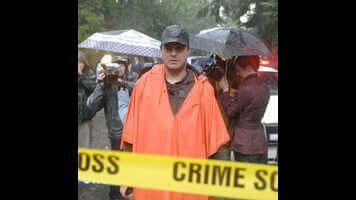As a general rule, caution should be taken to avoid judging a television show by its tumultuous development process. The journey from pitch to pilot to pick-up can be circuitous and bumpy, and it’s easy to overestimate the significance of the fits and starts by which a show makes it to air. Fox’s new cop drama Backstrom, which was euthanized by CBS before Fox reanimated it, is the exception to the rule. In Backstrom’s case, its false start actually did portend the quality of the product, and seems in hindsight like an omen unwisely ignored.
Rainn Wilson stars as Lieutenant Everett Backstrom, a misanthropic Portland detective attempting a professional comeback after spending five years exiled in the traffic division to atone for his consistently off-putting behavior. He’s drafted to lead a new department, the Special Crimes Unit, lending him the opportunity to restore his reputation for instinctively shrewd detective work, so long as he can keep his antisocial urges at bay. Or as Fox’s promotional art more succinctly puts it, Backstrom is a “brilliant detective” and a “total dick.”
It’s as intuitive for Fox to warm to Backstrom as it is counterintuitive for CBS to cool on it, given the latter network’s ravenous appetite for police procedurals. Fox has been searching for a rightful heir to the “brilliant asshole” slot left vacant since House ended in 2012. Backstrom also provides Fox an opportunity to deepen its relationship with creator Hart Hanson, whose other quirky procedural, Bones, has proven impervious to timeslot changes and performed reliably for 10 seasons. Hanson has a far less sturdy foundation in Backstrom, which is loosely adapted from Leif G.W. Persson’s series of Swedish crime novels.
Backstrom’s biggest liability is its main character. Wilson’s wan performance lacks dimensions, and the one note with which he plays the dour detective evokes Dwight Schrute at the peak of an intractable beet dieback. But it’s hard to imagine what more Wilson could do to elevate what’s on the page, given the character’s ineffective calibration. It’s safe to say Backstrom is, in fact, a total dick, but in this instance, “total dick” means “casual racist.” His grossest trait is his compulsion to constantly remind other characters that they are not white, as when he fixates on an African-American spectator at a crime scene, singling the man out for scrutiny as the “raisin in a bowl of corn flakes.”
What’s most obnoxious about Backstrom’s racist rejoinders is that they aren’t even rooted in genuine racial animus, merely a desire to be obnoxious in the most efficient manner possible. But he’s acquitted again and again, because for the show’s hook to work, Backstrom has to make up in competency what he lacks in agreeableness. Naturally, the raisin in the bowl of corn flakes has vital information about a college student’s murder, advancing the idea that racial profiling is justifiable so long as it’s done archly and the hunches occasionally pan out.
Backstrom is also a misogynist, a fact so evident on its face it’s unfortunate how often the show insists on forcing female characters like Backstrom’s partner Detective Gravely (Genevieve Angelson) to constantly point it out. The series’ tendency to show women going out of their way to tell Backstrom he hates women is as tacitly affirming of his sexism as the show is of his racism. Hanson seems to think he’s tut-tutting Backstrom’s treatment of women, when he’s actually just using his female characters as mouthpieces to remind the audience what an incorrigible scoundrel Backstrom is.
A show like Backstrom should be able to fall back on its cases of the week when all else fails; this is a procedural, after all, not a character study. But not even the procedural element works because the mission of the Special Crimes Unit is so ill defined. Law And Order: SVU has employed a broad definition of “special victims” when the story suits it, but it at least generally defines itself as a show about sex-crime detectives. The “special crimes” of Backstrom are never given any firm parameters. This allows the show to veer into whatever type of crime will provide its bull a new china shop, though Backstrom doesn’t put cracks in the china so much as make cracks about the Chinese. But the flexibility undermines the central premise. It’s one thing to reassign Backstrom from traffic if he has a specific expertise others lack, but his only unique quality is the sheer commitment to his Archie Bunker homage.
Of course, Backstrom’s fellow detectives tend to see it differently, wishing they could resent his rank behavior except that he’s purportedly talented. As Detective Niedermayer (Kristoffer Polaha) poetically puts it, “I believe that Backstrom lives intensely in the moment on a higher plane of existence from which he is able to hear the universe speak.” It’s one thing seeing Polaha saddled with such nonsense, but it’s especially painful to see Dennis Haysbert slumming it as a member of Backstrom’s squad. That also goes for Page Kennedy, best known as U-Turn from Weeds, who maintains his charisma even as the character weighs him down.
The world needs neither more by-the-book cop procedurals nor more cynicism, but Backstrom seems to think its fresh because it combines the two. Instead, Backstrom is a generic crime drama with its humanity stripped out. “The truth is always dark,” says Backstrom. “That’s how you know it’s the truth.” It isn’t a deep sentiment, but at least he resists the urge to spin it into a racist joke.


 Keep scrolling for more great stories.
Keep scrolling for more great stories.